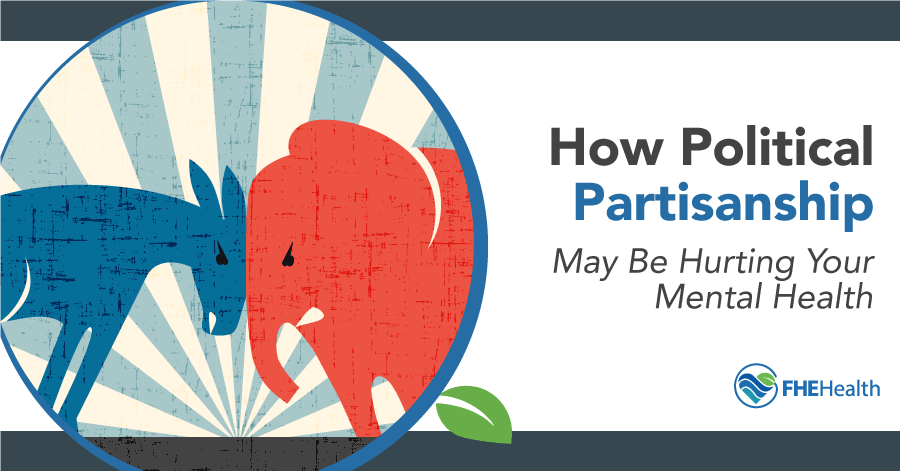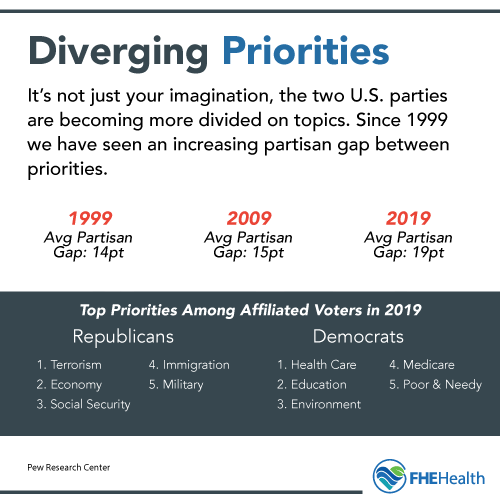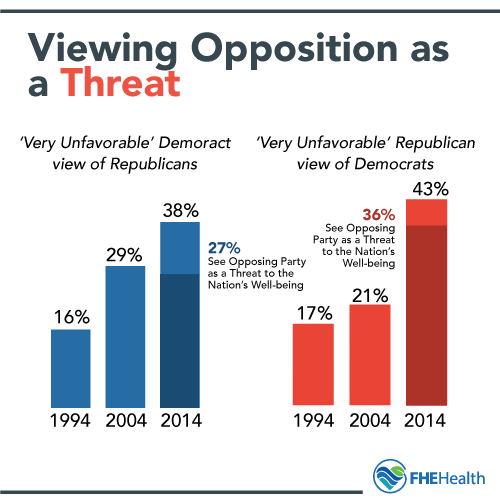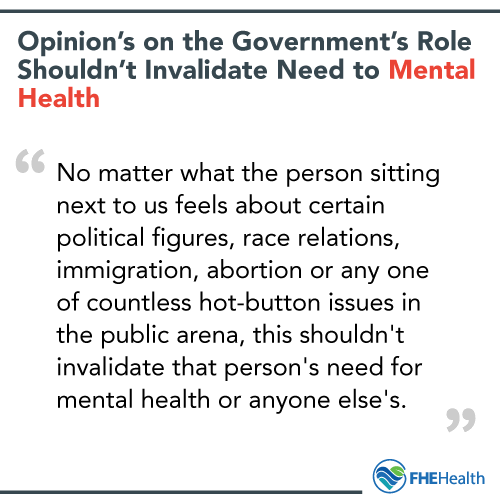
It’s no secret that the United States is undergoing a period of particularly high political partisanship, but what are the broader implications of this period on society? Is it healthy to be as combative about seemingly every topic that arises as we are today? What roles are social media and the age of real-time communication playing in the effects of this era of intense polarization, and how is our health affected as a result of all these factors?
In this piece, we’ll talk about, not whether any political opinion or strong emotion is valid, but the unhealthy effects of political partisanship, and why mental health should be prioritized in society more than it is currently.
How Partisan Is the World, Really?
 One study shows that Democrats and Republicans don’t agree on the solutions to key issues, and they no longer agree on what those issues actually are. In 1999, the two sides of the aisle generally shared the belief that health care, education and crime were among the most important issues. Over the next 20 years, Republicans began to place more importance on security issues like terrorism, war and immigration, while Democrats began to shift their priorities to social issues like education, health policy and the environment.
One study shows that Democrats and Republicans don’t agree on the solutions to key issues, and they no longer agree on what those issues actually are. In 1999, the two sides of the aisle generally shared the belief that health care, education and crime were among the most important issues. Over the next 20 years, Republicans began to place more importance on security issues like terrorism, war and immigration, while Democrats began to shift their priorities to social issues like education, health policy and the environment.
This problem isn’t new, but the divide is definitely worse than ever. One Pew study from 2004 found that 92 percent of Republicans leaned further to right than the median Democrat, and 94 percent of Democrats were to the left of the median Republican. A 2017 study showed that there are now far fewer moderate “centrists” than there were in 2004, meaning that extreme views have been brought to the forefront even more. Here are a just few possible explanations for this growing problem.
Government Issues
According to a Pew study from April 2019, American have less trust in the government than ever before. Cooperation in government is a lot lower as well because politicians are less likely to “reach across the aisle” and collaborate with those that their constituents don’t trust. Many politicians rode a wave of ‘no compromise’ promises to get to offices, they are actually upholding those promises by not legislating with the other party.
The Explosion of Social Media
Sites like Twitter give extremist groups voices that they may not have without a platform on social media. Far-left and far-right behaviors are amplified by social media in a very public way, distorting the perception of these groups’ legitimacy in the public discourse.
Studies have also pointed to an “echo chamber” effect on certain social media platforms. People are more likely to enter digital groups with like-minded individuals, meaning that as a society, we’re not exposing ourselves to competing viewpoints as much anymore. Further complicating this is the way the journalists use social media. While it is extremely convenient to see up-to-the-second updates and audience reactions to articles and news, Twitter is commonly mistaken for an accurate reflection of reality, and it’s not.
Particularly Polarizing Political Figures
Recently, a wave of populist politicians has swept world politics. These candidates have realized that our new political reality rewards catering to a more extreme part of their political base. The result has been more extreme candidates who are able to leverage the changes in social media without fear of alienating or openly antagonizing part of their electorate, leading to lower popularity, but enthusiastic support among their base.
What Is All of This Doing to Our Mental Health?
 So, we’ve established that we’re standing at a point where our country is as polarized as it’s ever been. Everything is hotly debated, from food takes to politics. To observe the impact that seemingly trivial things can have on our psyche, let’s just imagine we’re working on a political campaign.
So, we’ve established that we’re standing at a point where our country is as polarized as it’s ever been. Everything is hotly debated, from food takes to politics. To observe the impact that seemingly trivial things can have on our psyche, let’s just imagine we’re working on a political campaign.
To work on a campaign, you likely have to buy in on the candidate who employs you in a big way. You become a parrot of their ideology and more of a fan than an employee. You tie your self-worth to a politician and spend significant emotional capital helping them get elected. You go door to door, canvassing for this person, taking abuse from opponents you meet along the way. You work long hours, telling yourself it’s “for the greater good,” and win or lose, you become disillusioned by the whole process.
This isn’t to say democracy isn’t worth it. There are issues in the public eye right now that deserve to be fought over, no matter what you believe, but think about the effects that all this so-called partisan cheerleading is having on your mental health.
Depression and Polarization
Basically, a higher level of polarization in society means less cooperation and a worsening “us against them” mentality. What constant competition for the dominant viewpoint does is cause stress that wears away at a person’s mental health.
Studies have found is that the human brain does not function in a healthy way when under constant stress. Depression and stress are more strongly linked than most people realize. A side effect of chronic stress from issues on the news or arguments on Facebook is an overactive hypothalamic pituitary adrenal (HPA) axis. It’s okay if you don’t know what this means — what’s important is that an overactive HPA Axis has been found in 70 percent of people with clinical depression, according to one study.
Anxiety in the Modern Age
There is a significant reason to believe that our constant access to news and media is having a poor effect on our mental health. According to an analysis by Medical News Today, rates of anxiety are higher than they’ve been in the past, and developed countries with higher average incomes show higher rates of anxiety disorders than lower income countries.
This suggests that while being glued to our phones keeps us within a moment’s reach of any and all information we could possibly ask for, this is probably not healthy. Factor in all the political fighting and arguing on Facebook and Twitter, and it’s clear to see why many people live in a constant state of anger and stress, always fighting to get the last word or prove a point better than their peers.
We’re constantly told to pick a side and defend it — when a new bill comes up on the Congressional floor, when something major happens in international politics and even when a politician says something inflammatory. It’s an expectation thrust upon us when we’re online: that you’re either for this or against this. Not having an opinion grounds for an attack as well. There are plenty of ways technology has improved our mental health, but being feeling forced into picking a side and defending it isn’t one of them!
Mental Health Is Not Partisan
 What studying the effects of polarization on our mental health should do is teach us that no matter what you believe, your mental wellness should be more of a priority than it is in today’s age.
What studying the effects of polarization on our mental health should do is teach us that no matter what you believe, your mental wellness should be more of a priority than it is in today’s age.
No matter what the person sitting next to us feels about certain political figures, race relations, immigration, abortion or any one of countless hot-button issues in the public arena, this shouldn’t invalidate that person’s need for mental health or anyone else’s.
We’re at a turning point in society at the moment. Mental health for veterans, the homeless and other at-risk populations is absolutely crucial, and although policy has made some steps forward for mental health coverage, including partiy law,there’s still a long way to go before the stigma is gone and underserved groups get the care they need. We have yet to reach a place where bipolar disorder is treated the same way a medical issue diabetes would be; spoken about openly and without hesitation to seek help.
Mental Health Care at FHE Health
It’s important not to let the partisan nature of the modern political climate distract us from seeking your mental health needs. If you or a loved one is suffering from a mental health condition, contact FHE Health and learn more about getting the help you need.






